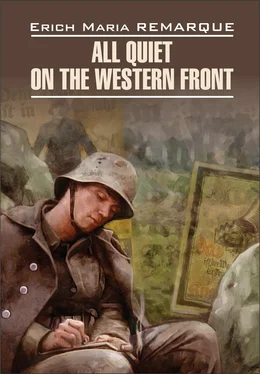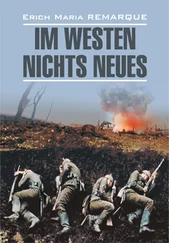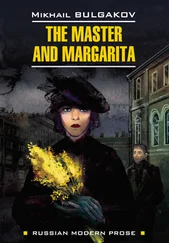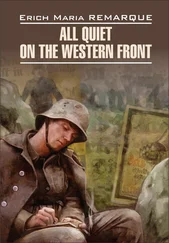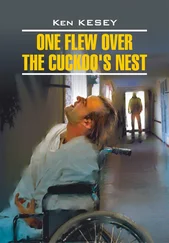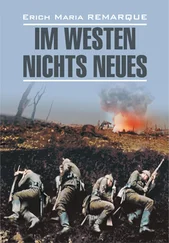Kat is worried. ‘If he reports you, there’ll be trouble.’
‘Do you think he will?’ asks Tjaden.
‘Bound to,’ I say.
‘You’ll get five days’ close arrest at the very least,’ says Kat.
That doesn’t bother Tjaden. ‘Five days in clink means five days rest.’
‘And what if they take you away and put you in jug?’ asks the indefatigable Muller.
‘Then the war is over for me until I get out.’
Tjaden is a happy-go-lucky type. He never worries. He clears off with Haie and Leer, so that when the balloon goes up they won’t be able to find him for a bit.
Meanwhile, Muller still hasn’t finished. He comes back to Kropp again. ‘Albert, if you really got to go home, what would you do?’
Kropp is full up now, and this makes him more expansive. ‘How many of our class at school would there be now?’
We reckon it up: out of twenty, seven are dead, four are wounded and one’s in an asylum. We could only get twelve together at the most.
‘Three of them are second lieutenants,’ says Muller. ‘Do you think they’d let Kantorek bawl them out nowadays?’
We don’t think they would. We wouldn’t let Kantorek bawl us out any more, either.
‘Come on, outline the tripartite plot of Schiller’s William Tell [133] outline the tripartite plot of Schiller’s William Tell – опиши тройственный сюжет «Вильгельма Телля» Шиллера. «Вильгельм Телль» – пьеса немецкого поэта, философа и драматурга Ф. Шиллера (1759–1805)
, ’ Kropp reminds us suddenly, and roars with laughter.
‘What were the principal aims of the Gottingen [134] Gottingen – Геттинген (университетский город на юге земли Нижняя Саксония в Германии)
poetic movement in the eighteenth century?’ demands Muller with a sudden severity.
‘How many children did Charles the Bold [135] Charles the Bold – Карл Смелый (1433–1477) – последний герцог Бургундии из Династии Валуа
have?’ I put in calmly.
‘You’ll never get on in life, Baumer,’ says Muller.
‘When was the battle of Zama?’ Kropp wants to know.
‘You are completely lacking in moral fibre [136] moral fibre – нравственный стержень
and high seriousness, Kropp. Sit down. C-minus [137] C-minus – буквенная система оценивания знаний обучающегося, соответствует оценке «3» в Российской образовательной системе
—’ I throw in.
‘What did Lycurgus [138] Lycurgus – Ликург (800–730 до н.э.) – древнеспартанский законодатель
consider to be the principal responsibilities of the State?’ hisses Muller, pretending to fiddle around with a pince-nez.
‘Is it “We Germans fear God and no one else in the world…” or “We comma Germans comma —”?’ I offer as food for thought.
Muller twitters back, ‘What is the population of Melbourne?’
‘How on earth [139] How on earth (разг.) – Каким же образом
are you going to get on in life if you don’t know that?’ I ask Albert indignantly.
But he trumps this with, ‘What do you understand by cohesion?’
We don’t remember much about all that stuff any more. It was no use to us anyway. Nobody taught us at school how to light a cigarette in a rainstorm, or how it is still possible to make a fire even with soaking wet wood – or that the best place to stick a bayonet is into the belly, because it can’t get jammed in there, the way it can in the ribs.
Muller thinks for a bit, and then says, ‘It’s no good; we’ll still have to go back to school.’
I think that’s quite out of the question. ‘Perhaps we could just sit the exams under the special regulations.’
‘You still need some preparation. And even if you pass, what happens then? Being a student isn’t much better. If you haven’t got much money, you have to study really hard.’
‘It is a bit better, but it’s still rubbish, all the stuff they fill your head with.’
Kropp sums it up for us when he says, ‘How can you take all that lot seriously when you’ve been out here?’
‘But you have to have some kind of job,’ puts in Muller, as if he were Kantorek himself.
Albert is cleaning his nails with the point of a knife. We are amazed by this genteel behaviour, but it is only because he is thinking. He puts the knife aside and says, ‘That’s the problem. Kat and Detering and Haie will go back to their old jobs because they had them already. So will Himmelstoss. We never had one. And how is this lot —’ he gestures over towards the front – ‘supposed to prepare us for anything?’
‘What you need is a private income and then you could go away and live on your own in the middle of some forest —’ I say, but at once I feel silly for coming up with such a daft idea.
‘What will become of us if and when we do get back?’ wonders Miuller, and even he is anxious.
Kropp shrugs. ‘I don’t know. Let’s just get there first and then see what happens.’
None of us really has any ideas. ‘What could we possibly do?’ I ask.
‘There isn’t anything I fancy doing,’ Kropp answers wearily. ‘One day you’ll be dead anyway, and what have you got then? In any case, I don’t think we’ll ever get home.’
‘If I think about it, Albert,’ I say after a little while, rolling over on to my back, ‘when I hear the word “peace”, and if peace really came, what comes into my head is that I’d like to do something, well, unimaginable. Something – you know what I mean – that would make it all worthwhile, being out here under fire and all the rest. But I just can’t picture what it could be. The only possibilities there are – this business with a job, studying, earning money and so on – they all make me sick, because they were always there and they put me off. I can’t think of anything, Albert, I can’t think of anything.’
All at once everything seems to me to be pointless and desperate.
Kropp takes it further along the same line. ‘It will be just as difficult for all of us. I wonder whether the people back at home don’t worry about it themselves occasionally? Two years of rifle fire and hand-grenades – you can’t just take it all off like a pair of socks afterwards —’
We all agree that it is the same for everyone; not only for us here, but for everyone who is in the same boat, some to a greater, others to a lesser extent. It is the common fate of our generation.
Albert puts it into words. ‘The war has ruined us for everything.’
He is right. We’re no longer young men. We’ve lost any desire to conquer the world. We are refugees. We are fleeing from ourselves. From our lives. We were eighteen years old, and we had just begun to love the world and to love being in it; but we had to shoot at it. The first shell to land went straight for our hearts. We’ve been cut off from real action, from getting on, from progress. We don’t believe in those things any more; we believe in the war.
There is a buzz of activity in the orderly room [140] orderly room – канцелярия подразделения
. Himmelstoss seems to have stirred them up. At the head of the little column trots the fat sergeant major [141] sergeant major – фельдфебель (воинское звание и должность унтер-офицерского состава в вооруженных силах)
. It’s funny how regular CSMs [142] CSM = company sergeant major – ротный фельдфебель
are nearly always fat.
Читать дальше
Конец ознакомительного отрывка
Купить книгу
